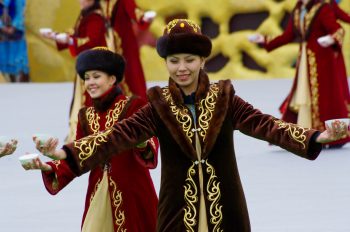Political Labels That Don’t Mean The Same Thing In Russian Posted by Maria on Oct 16, 2017

Most of Russian political terminology is international in origin, so the words are easy to recognize: демократия, капитализм, либерализм, национализм, and so on. However, the definition of the foreign-language cognate will not always match how the corresponding word is used in Russian. Либерализм Либерализм may have a different connotation in Russian than “liberalism” does in…
3 Incorrect Assumptions about Native Russian Speakers Posted by Maria on Oct 10, 2017

I sometimes hear statements about fluent Russian speakers abroad that are based on certain incorrect assumptions. Some of our readers know better, but others may discover something new from this post. Because this post touches upon deeply personal aspects of identity, language, ancestry, and political affiliation, it is quite natural that people will have different…
Не дай мне Бог сойти с ума: Mental Illness in Russian Posted by Maria on Oct 4, 2017

Mental health is a sensitive subject around the world, and Russian certainly attaches a certain stigma to mental health issues. Read about the different ways to refer to mental health in Russian and learn which expressions to use and which to avoid if you want to talk about this delicate issue with compassion. At Wits’…
A Sign of the Times: Words with ‑знак‑ in Russian Posted by Maria on Sep 26, 2017

We are continuing our popular series on Russian word “families” with this post about words with the -знак- root. Знак means “a sign,” and you may know it from the following expressions: мя́гкий знак (soft sign, ь) or твёрдый знак (hard sign, ъ) вопроси́тельный знак (?) восклица́тельный знак (!) знак ра́венства (=) знак зодиа́ка (star…
To be or not to be?: Using “быть”, “есть”, and other terms of existence in Russian Posted by Pat Goodridge on Sep 25, 2017

Understanding these verbs is crucial to describing the world in Russian. Most English-speakers find the very “to be” to be a central part of speech. The reason is clear to us natives: The verb is dynamic enough to denote existence, state, and mood. For example, “There is an eclipse happening”, “The door is open”…
What Does A Russian Miss Abroad? Posted by Maria on Sep 21, 2017

Naturally, the answer to this question will vary depending on the person, their preferences, and the destination of their travel. However, I can think of several things that are likely to be missed by many Russians abroad and perhaps by some people from the neighboring countries, too. Tea Kettle As we mentioned on this blog…
Cossack or Kazakh: What’s The Difference and What To Call Them In Russian? Posted by Maria on Sep 14, 2017

You might have come across several similar words in English: cossack, kazakh, perhaps even kozak or kazak. You probably know they refer to groups of people, but which groups? Are they interchangeable? This post will explain the corresponding words and their definitions in Russian so next time you come across any of them, it will be a little clearer…


